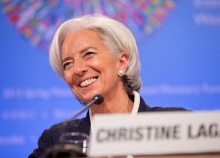
Typical street scene in Santa Ana, El Salvador. (Photo: iStock)
IMF Survey : Move From ‘Three-speed’ To ‘Full-speed’ Global Recovery, Urges Lagarde
April 18, 2013
- Cooperation more important than ever, given vast interconnections
- In interlinked world, uneven global recovery is not enough
- Full-speed recovery requires broad, customized policy actions
The global economy can move beyond an uneven recovery to achieve “full-speed” if countries take customized action on a range of policy fronts, IMF Managing Director Christine Lagarde said.

Lagarde: ‘We need to protect the people most affected by the crisis and make sure that adjustment is as fair as possible’ (photo: Stephen Jaffe/IMF)
IMF-World Bank Spring Meetings
She told reporters at the 2013 IMF–World Bank Spring Meetings that a “three-speed” global economy comprising countries that are doing well, that are on the mend, and those that still have some distance to travel, would not be sufficient to foster balanced and lasting growth.
“What we need is a full-speed global recovery—one that works with growth that is solid, sustainable, and balanced but also inclusive and very much rooted in green development,” Lagarde told a news conference at the start of the Spring Meetings in Washington, which involve economic policymakers from the IMF’s 188 member countries, government officials, civil society organizations, journalists, and invited participants from the academic and private sectors.
The Spring Meetings agenda includes seminars, regional briefings, and press conferences focused on the global economy, international development, and the world’s financial markets.
Customized policies
Lagarde stressed that a full-speed global economy would require customized policy responses in each of the three speed groups of countries. In particular, the IMF would draw attention to the spillovers that pass through an increasingly interconnected global economy.
“In all of this, cooperation remains essential. That is why the IMF was founded in the first place and—in a world of vast interconnections—it is more important than ever,” Lagarde said.
Lagarde echoed her earlier warning of a three-speed global recovery, involving those countries that are doing well (mainly the emerging markets and developing countries), those that are on the mend (including the United States, Sweden, and Switzerland), and those that still have some distance to travel (such as the Euro Area and Japan).
• First speed group: Emerging markets should rebuild policy space and strengthen financial regulation and supervision while low-income countries should build on success and invest in the future—including by meeting infrastructure and social needs.
• Second speed group: While the United States has managed to avoid the fiscal cliff, it still needs to fix the pace of fiscal adjustment—less and better-quality adjustment now, much more in the future.
• Third speed group: On the euro area, policymakers have accomplished a great deal over a short period of time. The priority now is to fix frayed banking systems and press ahead with banking union. In Japan, the recently-announced framework of ambitious monetary easing is a positive step. But Japan needs more ambitious plans to bring down debt, plus structural reforms to shift the economy into higher gear.
Lagarde underscored that policymakers must also address old risks that have not yet been fully resolved, urging them to “finish the job” on financial sector reform, work to lessen global imbalances, and to vigorously promote growth, jobs, and equity. “We need to protect the people most affected by the crisis and make sure that adjustment is as fair as possible,” she said.
Lagarde stressed the IMF’s focus on serving its 188 members and emphasized the organization’s efforts to evolve in step with changes in the global economy. “It is critically important that we need to be the mirror of where the world is going,” she said.
She addressed a broad range of topics in her opening news conference, tackling subjects ranging from multilateralism to South Sudan.
• On multilateralism, she noted that throughout the crisis governments have made strong efforts to avoid fragmentation. “Cooperation remains essential,” she said, noting that certain forms of regionalism, such as regional trade agreements, can help foster trade among certain groups of countries.
• On global imbalances, Lagarde noted that IMF is assessing external imbalances and misalignments through its new External Sector Report. “We are striving to shine a light on the spillovers that weave and wend their way through an increasingly interconnected global economy,” she said.
• On Egypt, Lagarde emphasized the Fund’s commitment to help. She said she sees a role for external support: “The country is exposed to vulnerabilities, it has lost quite a bit of reserves. It is growing, but the growth numbers could be certainly a lot better if the situation was stable from the financial and economic point of view,” she said.
• Questioned about the Fund’s outlook on the United Kingdom’s fiscal consolidation approach, Lagarde said “Over the years what we have done at the IMF is really try to observe as closely as possible what the outcome of the policy was, and we clearly support the policy. And we have said so repeatedly. However, we have also repeatedly said in the last couple of years—and I would not prejudge what we’ll do with the next Article IV—that should growth abate, should growth be particularly low, then there should be consideration to adjusting by way of slowing the pace. This is nothing new.”
• Lagarde also welcomed the recent announcement by Sudan and South Sudan to implement security and an oil revenue-sharing agreement.


